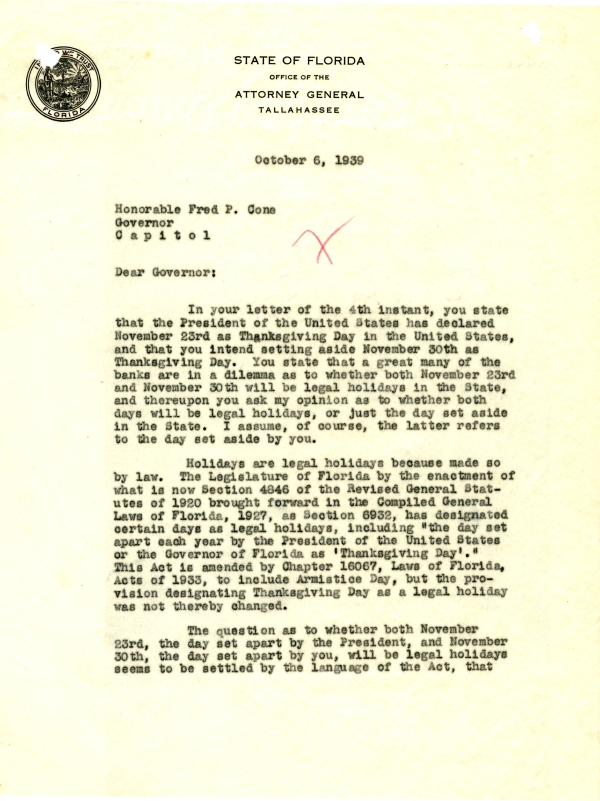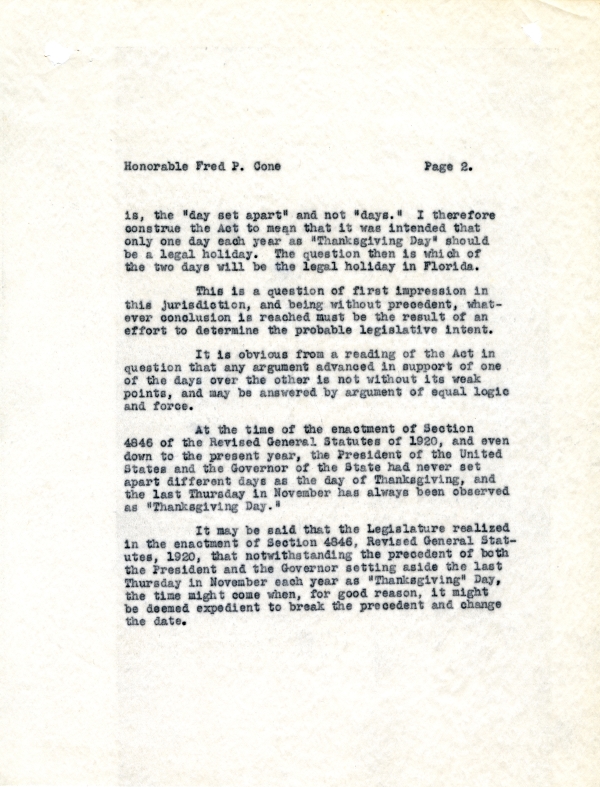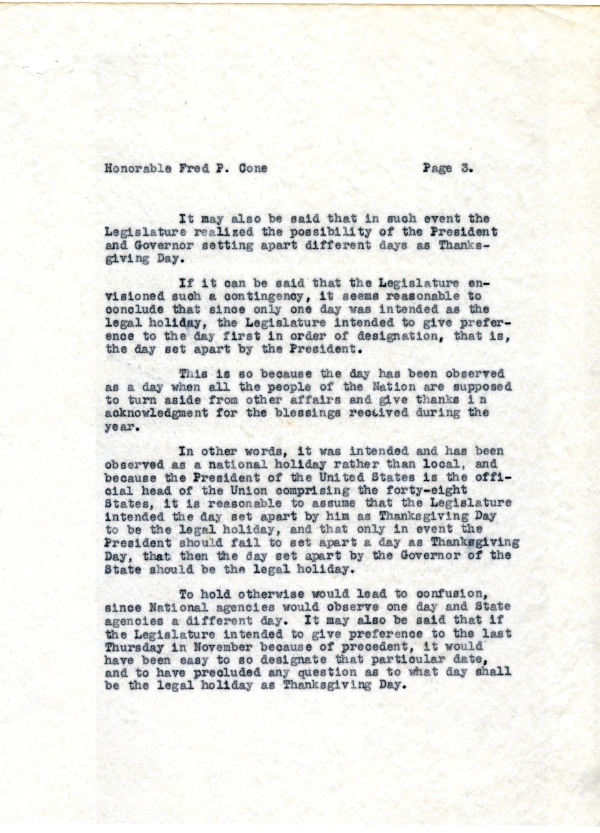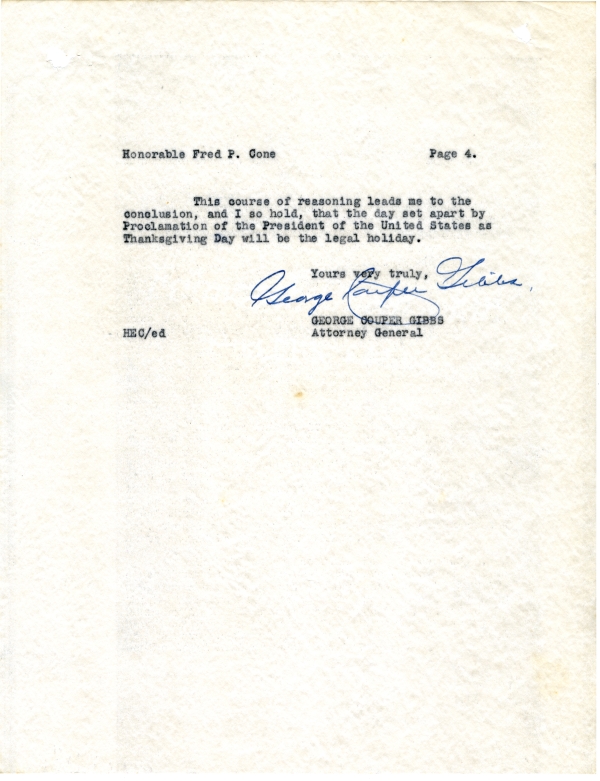STATE OF FLORIDA OFFICE OF THE ATTORNEY GENERAL
TALLAHASSEE
October 6, 1939
Honorable Fred P. Cone
Governor
Capitol
Dear Governor:
In your letter of the 4th instant, you state that the President of the United States has declared November 23rd as Thanksgiving Day in the United States, and that you intend setting aside November 30th as Thanksgiving Day. You state that a great many of the banks are in a dilemma as to whether both November 23rd and November 30th will be legal holidays in the State, and thereupon you ask my opinion as to whether both days will be legal holidays, or just the day set aside in the State. I assume, of course, the latter refers to the day set aside by you.
Holidays are legal holidays because made so by law. The Legislature of Florida by the enactment of what is now Section 4846 of the Revised General Statutes of 1920 brought forward in the Compiled General Laws of Florida, 1927, as Section 6932, has designated certain days as legal holidays, including "the day set apart each year by the President of the United States or the Governor of Florida as 'Thanksgiving Day'." This Act is amended by Chapter 16067, Laws of Florida, Acts 1933, to include Armistice Day, but the provision designating Thanksgiving Day as a legal holiday was not thereby changed.
The question as to whether both November 23rd, the day set apart by the President, and November 30th, the day set apart by you, will be legal holidays seems to be settled by the language of the Act, that
Honorable Fred P. Cone
Page 2.
is, the "day set apart" and not "days." I therefore construe the Act to mean that it was intended that only one day each year as "Thanksgiving Day" should be a legal holiday. The question then is which of the two days will be the legal holiday in Florida.
This is a question of first impression in this jurisdiction, and being without precedent, whatever conclusion is reached must be the result of an effort to determine the probable legislative intent.
It is obvious from a reading of the Act in question that any argument advanced in support of one of the days over the other is not without its weak points, and may be answered by argument of equal logic and force.
At the time of the enactment of Section 4846 of the Revised General Statues of 1920, and even down to the present year, the President of the United States and the Governor of the State had never set apart different days as the day of Thanksgiving, and the last Thursday in November has always been observed as "Thanksgiving Day."
It may be said that the Legislature realized in the enactment of Section 4846, Revised General Statues, 1920, that notwithstanding the precedent of both the President and the Governor setting aside the last Thursday in November each year as "Thanksgiving" Day, the time might come when, for good reason, it might be deemed expedient to break the precedent and change the date.
Honorable Fred P. Cone
Page 3.
It may also be said that in such event the Legislature realized the possibility of the President and Governor setting apart different days as Thanksgiving Day.
If it can be said that the Legislature envisioned such a contingency, it seems reasonable to conclude that since only one day was intended as the legal holiday, the Legislature intended to give preference to the day first in order of designation, that is, the day set apart by the President.
This is so because the day has been observed as a day when all the people of the Nation are supposed to turn aside from other affairs and give thanks in acknowledgment for the blessings received during the year.
In other words, it was intended and has been observed as a national holiday rather than local, and because the President of the United States is the official head of the Union comprising the forty-eight States, it is reasonable to assume that the Legislature intended the day set apart by him as Thanksgiving Day to be the legal holiday, and that only in event the President should fail to set apart a day as Thanksgiving Day, that then the day set apart by the Governor of the State should be the legal holiday.
To hold otherwise would lead to confusion, since National agencies would observe one day and State agencies a different day. It may also be said that if the Legislature intended to give preference to the last Thursday in November because of precedent, it would have been easy to so designate that particular date, and to have precluded any question as to what day shall be the legal holiday as Thanksgiving Day.
Honorable Fred P. Cone
Page 4.
This course of reasoning leads me to the conclusion, and I so hold, that the day set apart by Proclamation of the President of the United States as Thanksgiving Day will be the legal holiday.
Yours very truly,
[Signature] George Couper Gibbs
Attorney General
HEC/ed




 Listen: The Latin Program
Listen: The Latin Program

